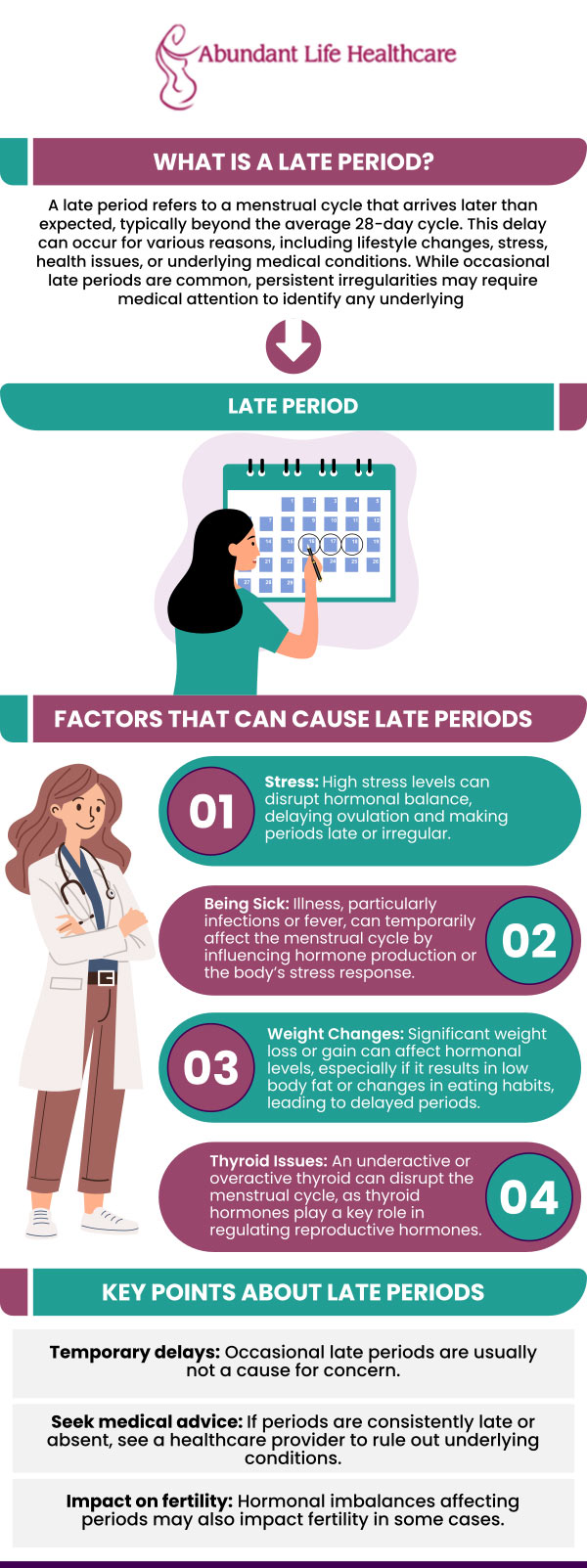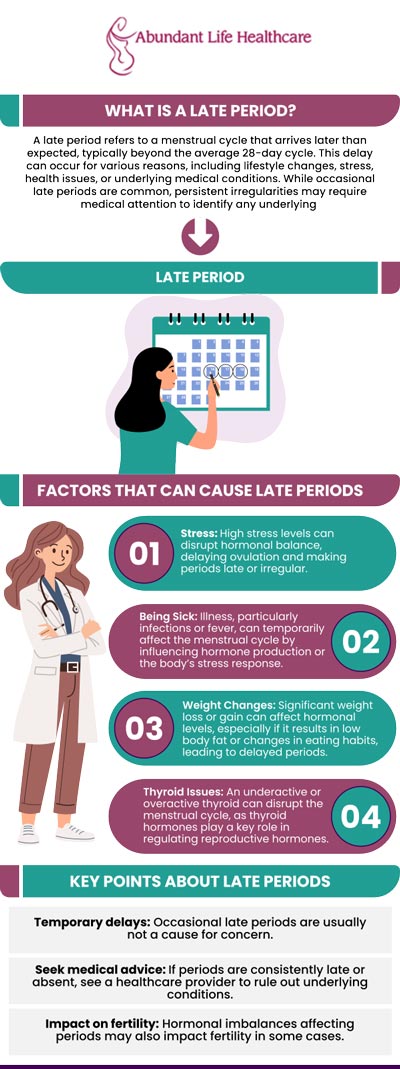Is a Late Period Always a Sign of Pregnancy?
A late period isn’t always a sign of pregnancy, as many factors can disrupt a regular menstrual cycle. Stress, sudden weight changes, excessive exercise, or underlying medical conditions like thyroid disorders or PCOS can all cause a missed or late period. If you have concerns, visit Dr. Marc Jean-Gilles, DO, FACOG, for an accurate diagnosis. For more information, contact us today or book an appointment online. We are conveniently located at 601A Professional Drive, Suite 370, Lawrenceville, GA 30046.


Table of Contents:
What are the most common causes of a late or missed period besides pregnancy?
How late is too late? When should you be concerned about a missed period?
Besides a missed period, what are the early signs of pregnancy to look for?
How long should I wait before taking a pregnancy test?
Late or missed period can be concerning, and we’re here to support you every step of the way. While pregnancy is often the first thing that comes to mind, there are many other reasons why your menstrual cycle might be irregular, and many are manageable with the right care.
Common causes include:
Stress: High levels of stress can disrupt the hormones that regulate your cycle.
Significant weight changes: Rapid weight loss or gain, as well as eating disorders such as anorexia or bulimia, can affect hormonal balance.
Excessive exercise: Intense physical activity may lead to irregular periods, especially among athletes.
Hormonal imbalances: Conditions like polycystic ovary syndrome (PCOS) are frequently responsible for missed or irregular cycles.
Thyroid disorders: Both hyperthyroidism and hypothyroidism can impact menstrual regularity.
Medications: Certain birth control methods or psychiatric medications may alter your cycle.
Chronic or acute illnesses: Ongoing or sudden medical conditions can temporarily disrupt menstruation.
Perimenopause: As you approach menopause, it is normal for periods to become less regular.
Changes in routine: Travel, changes in work schedule, or altered sleep patterns may also affect your cycle.
If you are experiencing frequent late or missed periods, or if you notice additional symptoms such as pain, fatigue, or unexpected weight changes, we encourage you to schedule an appointment at Abundant Life Healthcare. Our compassionate providers will listen to your concerns, perform a thorough evaluation, and work with you to identify the underlying cause. Together, we’ll develop a personalized plan to support your reproductive health and overall well-being.
Most menstrual cycles range from 21 to 35 days, and it’s not unusual for your period to arrive a few days early or late, especially if you’ve recently experienced stress, changes in your weight or exercise habits, illness, or disruptions to your daily routine.
Generally, a period is considered “late” if it hasn’t started five or more days after you expected it. A period is usually considered “missed” when you have gone 35 days or more without bleeding, particularly if your cycles are normally regular. If your period is only a few days late, it’s often not a cause for immediate concern.
However, you should be more attentive if your period is more than a week late, especially if you have regular cycles and are sexually active, as this could be a sign of pregnancy. Other possible causes for a missed period include significant weight changes, intense physical activity, stress, thyroid disorders, polycystic ovary syndrome (PCOS), or certain medications.
If you miss more than one period in a row and you’re not pregnant, or if you experience additional symptoms such as severe pain, unusual discharge, significant hair growth, or unexplained weight changes, it’s important to contact your healthcare provider. Our providers can help determine the underlying cause of your missed periods and work with you to develop an appropriate treatment plan tailored to your needs.
Many women first notice a missed period, but there are several other early symptoms that may indicate pregnancy. Our compassionate team is here to help you recognize and navigate these changes.
Some common early signs include breast tenderness or swelling, increased sensitivity, and unexpected fatigue, often caused by hormonal shifts like a rise in progesterone. You may also experience nausea (commonly called morning sickness), which can occur at any time of day and may sometimes be accompanied by vomiting. More frequent urination is another early sign, as your body increases blood production and your kidneys process more fluid.
Other changes you might notice include heightened sensitivity to smells, new food aversions or cravings, and mood swings due to fluctuating hormones. Light spotting or implantation bleeding can sometimes be mistaken for a light period but is generally lighter and shorter. Mild cramping, headaches, constipation, and mild dizziness are also possible in early pregnancy.
While these symptoms can suggest pregnancy, they are not exclusive to it. If you think you might be pregnant, we encourage you to schedule a visit. Our caring providers can offer accurate testing, answer your questions, and help you begin your journey with confidence and support.
At Abundant Life Healthcare, we understand that waiting to find out if you’re pregnant can be an anxious time. For the most accurate results, we recommend taking a home pregnancy test after you have missed your period. These tests work by detecting the hormone hCG (human chorionic gonadotropin) in your urine, which is produced after a fertilized egg implants in the uterus—usually about 6 to 12 days after conception.
If you have a regular menstrual cycle, testing on the first day your period is late is usually reliable. While some tests claim to provide early results a few days before your expected period, testing too soon can lead to a false negative.
If your cycles are irregular, or you’re unsure when your next period is due, waiting at least 21 days after unprotected sex before testing can help improve accuracy. If your initial test is negative but your period still hasn’t started, repeat the test after a few days.
At Abundant Life Healthcare, your reproductive health is our priority. If you continue to get negative results yet still do not have your period, or if you notice any concerning symptoms, please schedule a visit with our caring team. We are here to provide support, answer your questions, and guide you through your healthcare journey. For more information, contact us today or book an appointment online. We are conveniently located at 601A Professional Drive, Suite 370, Lawrenceville, GA 30046. We serve patients from Lawrenceville GA, Suwanee GA, Snellville GA, Duluth GA, Dacula GA, Lilburn GA, Loganville GA, Auburn GA, and surrounding areas.
Check Out Our 5 Star Reviews


Additional Services You May Like

Additional Services You May Like
- Obstetrics
- Pregnancy
- Gynecologist
- Birth Control
- Labiaplasty
- Microblading
- Weight Loss
- Semaglutide GLP-1
- Pap Smears
- Pelvic Pain
- Laser Hair Removal
- In House Ultrasound (Including 3D)
- Vaginal Birth After C-Section (VBAC)
- Pregnancy As High Risk
- Multiple Gestations
- Postpartum Counseling
- 24hour/365days On Call Service
- Annual Exam
- Abnormal Uterine Bleeding
- Management Of Endometriosis
- Ultrasound
- Pelvic Organ Prolapse
- Urinary Incontinence
- Perimenopause And Menopause
- Sexual Dysfunction
- Fat Freeze (Like Cool Sculpting)
- Body Contouring
- Ozempic
- Civil Surgeon
- Hormone Replacement Therapy
- Immigration Medicine
- Biote Hormone Pellets
- GLP-1
- Peptide Therapy




